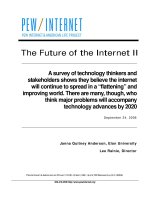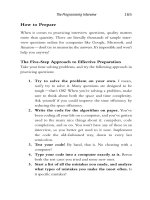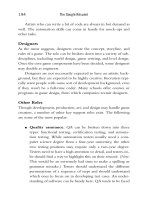Hacking the ultimate beginners guide to experts guide to computer hacking, penetration testing and basic security coding
Bạn đang xem bản rút gọn của tài liệu. Xem và tải ngay bản đầy đủ của tài liệu tại đây (405.54 KB, 66 trang )
Hacking:
The Ultimate Beginners
to Experts Guide to
Computer Hacking,
Penetration Testing and
Basic Security Coding
Contents
Introduction
Chapter 1 – Ethical Hacking
Chapter 2 – Types of Hackers
Chapter 3 – Hacking Methods and their
Prevention
Chapter 4 – Knowing the Target and
Victim
Chapter 5 – Types of Malware
Chapter 6 – Spy Programs and
Computer Viruses
Conclusion
Introduction
Hackers are those individuals who use
their knowledge of computers to
infiltrate and compromise the security of
other computer networks. They often
target home and office computers that
are connected to the Internet. The
Internet is a gateway to a computer to
connect to the world, which also makes
it vulnerable to attacks from hackers
across the globe. Hackers can work
alone or in groups, and in a lot of cases
are self-taught.
Positive Side of Hacking
Supporters argue that despite
the
inconvenience, hackers can cause benefit
to the systems of business, they also
provide high security to big companies;
it helps to make the Internet safer.
Businesses nowadays tend to employ
"ethical hackers" whose agenda is to test
online security based systems and keep
away potential threats.
Ethical hackers test the networks for
vulnerabilities. Their aim is to check if
these networks are secure enough to get
past their security defenses. They ensure
their companies are not susceptible in
any way to attacks from the black and
Grey hat hackers who are the bad
hackers.
Thank you for choosing to read this
book. I believe it will answer your
questions and help you understand
hacking more.
Chapter 1 – Ethical
Hacking
Does the famous word hacking sound
familiar? Does it scare you? Ironically
hacking is not that bad as many may
think. Illegal hacking is bad, legal
hacking on the other hand is doing us
good. If this is your first book or reading
on hacking then surely you will get some
potential insight on hacking after reading
this. My article gives a simple overview
on ethical hackers.
The term ethical hacker came to surface
in the late 1970s when the government of
United States of America hired groups of
experts called 'red teams' to hack its
hardware and software system. Hackers
are cyber criminals or online computer
criminals that practice illegal hacking.
They penetrate into the security system
of a computer network to fetch or extract
information.
Technology and internet facilitated the
birth and growth of network evils like a
virus, anti-virus, hacking and ethical
hacking. Hacking is a practice of
modification of a computer hardware
and software system. The illegal
breaking of a computer system is a
criminal offense. Recently a spurt in the
hacking of computer systems has opened
up several courses on ethical hacking.
A 'white hat' hacker is a moral hacker
who runs penetration testing and
intrusion testing. Ethical hacking in the
process of legally hacking a computer
system, that is hacking with permission
and penetrating into the systems'
database database. The whole idea
behind this is to secure the
vulnerabilities and loopholes in the
cyber-security system.
Legal hacking experts are usually
Certified Ethical Hackers who are hired
to prevent any potential threat to the
computer security system or network.
Courses for ethical hacking have become
widely popular, and many are taking it
up as a serious profession. Ethical
hacking courses have gathered huge
responses all over the world.
The moral hacking experts run several
programs to secure the network systems
of companies.
A moral hacker has legal permission to
breach the software system or the
database of a company. The company
that allows a probe into its security
system must give legal consent to the
moral hacking school in writing.
Moral hackers only look into the security
issues of the company and aim to secure
the breaches in the system.
The school of moral hackers runs
vulnerability assessment to mend
loopholes in the internal computer
network. In addition to this, they run
security software application programs
which are used as the measure to prevent
against any form of illegal hacking.
Legal hacking experts are people who
are used to detect vulnerabilities in
systems which are loopholes for the
entry of online cyber criminals. They
conduct these tests mainly to check if the
hardware and software programs are
effective enough to prevent any
unauthorized entry.
The moral experts conduct this test by
replicating a cyber attack on the network
to understand how strong it is against
any network intrusion.
The vulnerability test must be done on a
regular basis or annually. The company
must keep a comprehensive record of the
findings and check for further reference
in the future.
Chapter 2 – Types of
Hackers
Internet hacking is a game for some
people. They receive a level of
satisfaction from accomplishing the task.
For many others, breaking into systems
is simply a way of ensuring that their
own personal or business' security
system is successfully keeping out
hackers. When people start getting into
illegal hacking, they are breaking the
law and therefore may be subject to
serious legal consequences if they are
caught and convicted of an offense.
Some of the different types of computer
hacking are outlined below:
White hat - Legal hacking. Typically
used for the benefit for those wanting to
know whether or not their systems are
secure.
Black hat - Using hacking for personal
gain.
Grey hat - This type of computer hacking
is a combination of the two kinds listed
above. A grey hat hacker uses legal
breaking into a computer while using the
information for personal gain.
Blue hat - Permission is given to another
party to break into a computer security
system to test for any bugs or errors.
Elite – This term is used to describe
hackers who are extremely talented.
Script kiddie – These are the hackers
who often use the tools and advice of
other people to hack into the system.
Typically these hacker not extremely
knowledgeable as far as computers are
concerned.
Neophyte - Inexperienced in the field of
internet basics.
Hacktivism - Spreads a message about
personal beliefs through breaking into
computer security systems.
Many of these types of hackers,
especially talented ones, break laws. No
matter the degree of the crime, those
arrested are entitled to a defense
attorney to protect them from harsh
sentences. Sentences for these charges
can be more than 10 years.
Chapter 3 – Hacking
Methods and their
Prevention
What's a or who is referred to as the
Hacker?
"Hacker" is a term that has a different
meanings. This is based on who and the
context that it is used. Thanks to
Hollywood, most people think a hacker
is someone who gains access to a
network or computer(s) and steals stuff.
Also hackers are considered people who
break into military networks then they
launch missiles for fun.
These days, a hacker doesn't have to be
a geek from a top university who breaks
into banks and government systems. A
hacker can be anyone, even the kid next
door.
With an ordinary laptop, anyone can
download simple software off the
Internet to see everything that goes into
and out of a computer on the same
network. And the people who do this
don't always have the best of intentions.
These days, we are faced with a new
type of hacker - your next door neighbor.
Every day, thousands of people
download simple software tools that
allow them to "sniff" wifi connections.
Some do this just to eavesdrop on what
others are doing online. Others do this to
steal personal data in an attempt steal an
identity.
The Most Common Attacks
Mass Meshing
Also known as mass SQL injection, this
is a technique whereby the hackers
poison websites by imbedding illegally
a redirection javascript from the code of
the legitimate websites previously
infected and controlled by the hackers.
These javascripts redirect the visitor's
computer to servers which contain
additional malicious programs that can
attack a user's computer.
Common targets are Web Servers and
Personal Computers
With the ever growing use of wifi,
laptops are becoming one of the most
hacked devices. Everything a person
visits online can be exposed to a person
using software to "sniff" that connection.
The website URL, passwords used to
log into an online banking account,
Facebook pictures, tweets, and an entire
instant message conversation can be
exposed. It is the easiest form of hacking
as it requires little skill.
Tablets and Palm Top devices
Tablets, cell phones, and other mobileready devices are just as popular as
laptops are in wifi hotspots. A hacker in
a public hotspot can see a mobile
device, as well as all data going into and
out of it, just as easily as he can a
laptop.
How You Can Protect Yourself
The simple truth is that anyone
connecting to the Internet is vulnerable
to being hacked. Thus, there is a need to
be proactive when it comes to protecting
yourself from such attacks.
Sniffing attacks are the most dangerous,
as firewalls and antivirus software
cannot help. Only a personal VPN can
protect a person from a sniffer. The
would-be victim, if connected to a
personal VPN, has all their data routed
through a secure server, making it
impossible for the hacker to sniff. A user
who has a secure VPN can surf as if he
or she is invisible to hackers. PRIVATE
WiFi provides such a VPN service.
Chapter 4 – Knowing the
Target and Victim
One of the questions I hear all of the
time is "who are these hackers, and why
are they targeting me?" Many individuals
tend to assume hackers are geeks or also
referred to as super-smart kids who are
poorly behaved and they get a kick out of
manipulating the system and causing
mischief.
Today, hacking is no longer kid's stuff,
but a multi-billion dollar industry that
spans the globe. Some experts believe
that as many as 25% of all computers are
infected by hacker's software. A big









